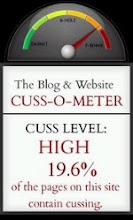Wednesday, February 24, 2010
Wednesday, February 17, 2010
$hiti's Plan 2 Keep U in Yer Home (for 6mos. then OUT)
I came across this article in "Jr. Deputy Accountant" and piqued my interest as we are in the "process" of having $hitiMortgage modify our loan, and I have learned a few things about our own mortage and who or who dosent "own it," in other words, who REALLY has standing to forclose, and you would be suprized. In our case, ITS NOT $hiti!Ours was one of those mortages sold in bundles to investors, so what did $hiti loose and how come we "owe" them and not the investor that bought our mortage for probably pennies on the dollar?
--------------------------------
(h/t WC Varones via Greg Fielding @ Danville Real Estate Trends)
Hahahahahahahahahahaha no fucking way can they actually believe anyone will fall for this. Seriously? Hand over the deed to your house to CitiMortgage, get a few bucks to get the hell out of town and get stuck with maintenence and HOA fees in exchange for what exactly? Citi? Can you explain the service you're providing? Because if it were me and I needed to walk away from my house, I'd use my deed in lieu of TP before handing it over to you crooks.
Squatters get better treatment than this and they don't have to pay utilities.
MarketWatch:
In exchange for the deed on their property, CitiMortgage will allow borrowers to stay in their homes for a period of up to six months. At the end of the six months, the borrower will turn over the property deed to CitiMortgage, and CitiMortgage will provide a minimum of $1,000 in relocation assistance to the borrowers. Citi will also provide relocation counseling by trained professionals and will cover certain monthly property expenses if Citi determines that the borrower can no longer afford them. Payment of utilities costs will be the responsibility of the borrower. Other costs incurred by the borrower, such as homeowner’s association and escrow fees, will be determined on a case-by-case basis considering the borrower’s specific financial circumstances. As part of the agreement, borrowers must maintain the property in its current condition and agree to bi-monthly meetings during which trained relocation professionals will help the borrower prepare for the next chapter of their lives.
Before a borrower enters the Foreclosure Alternatives Program, they must first be evaluated for a permanent mortgage modification. For those who do not qualify for a modification or another solution, CitiMortgage will explore the possibility of a short sale in which the company might accept a buyer’s offer for less than the outstanding amount of the mortgage. If a short sale is not feasible, then the borrower may be considered for the deed-in-lieu program. In addition, in order to be eligible, homeowners must hold first mortgages with a clear title owned by CitiMortgage, occupy the property, and be at least 90 days delinquent on their mortgage payments.
Now listen, we could get in the old "shouldn't have bought the damn house if you couldn't afford it" argument for the bazillionth time or we could actually waste precious energy railing on asshats like Citi who think it is entirely appropriate to pull this shit and get away with it.
Which they will because, well, who is going to stop them? Andrew Cuomo? The NY Fed? Obama himself couldn't Executive Order these pricks to a punishment appropriate for their misdeeds, why stop now?
I'll be over here in my rented apartment counting the $100s stuffed in my mattress if anyone needs me. Bitches.
---------------
Click on title above to email the author and let him know what you think
--------------------------------
(h/t WC Varones via Greg Fielding @ Danville Real Estate Trends)
Hahahahahahahahahahaha no fucking way can they actually believe anyone will fall for this. Seriously? Hand over the deed to your house to CitiMortgage, get a few bucks to get the hell out of town and get stuck with maintenence and HOA fees in exchange for what exactly? Citi? Can you explain the service you're providing? Because if it were me and I needed to walk away from my house, I'd use my deed in lieu of TP before handing it over to you crooks.
Squatters get better treatment than this and they don't have to pay utilities.
MarketWatch:
In exchange for the deed on their property, CitiMortgage will allow borrowers to stay in their homes for a period of up to six months. At the end of the six months, the borrower will turn over the property deed to CitiMortgage, and CitiMortgage will provide a minimum of $1,000 in relocation assistance to the borrowers. Citi will also provide relocation counseling by trained professionals and will cover certain monthly property expenses if Citi determines that the borrower can no longer afford them. Payment of utilities costs will be the responsibility of the borrower. Other costs incurred by the borrower, such as homeowner’s association and escrow fees, will be determined on a case-by-case basis considering the borrower’s specific financial circumstances. As part of the agreement, borrowers must maintain the property in its current condition and agree to bi-monthly meetings during which trained relocation professionals will help the borrower prepare for the next chapter of their lives.
Before a borrower enters the Foreclosure Alternatives Program, they must first be evaluated for a permanent mortgage modification. For those who do not qualify for a modification or another solution, CitiMortgage will explore the possibility of a short sale in which the company might accept a buyer’s offer for less than the outstanding amount of the mortgage. If a short sale is not feasible, then the borrower may be considered for the deed-in-lieu program. In addition, in order to be eligible, homeowners must hold first mortgages with a clear title owned by CitiMortgage, occupy the property, and be at least 90 days delinquent on their mortgage payments.
Now listen, we could get in the old "shouldn't have bought the damn house if you couldn't afford it" argument for the bazillionth time or we could actually waste precious energy railing on asshats like Citi who think it is entirely appropriate to pull this shit and get away with it.
Which they will because, well, who is going to stop them? Andrew Cuomo? The NY Fed? Obama himself couldn't Executive Order these pricks to a punishment appropriate for their misdeeds, why stop now?
I'll be over here in my rented apartment counting the $100s stuffed in my mattress if anyone needs me. Bitches.
---------------
Click on title above to email the author and let him know what you think
Wednesday, February 10, 2010
Chicago Housing Recovery: Not Until 2013
By Jason Hahn
Feb 9th 2010 @ 9:00AM
What do the Indianapolis Colts and the Chicago housing market have in common?
They'll both have to wait at least another year for redemption. But bad news for Chicago's housing market - it may have to wait even longer than the Super Bowl losers.
According to John Burns Real Estate Consulting, an Irvine, Calif.-based company that focuses on home building industry decisions, Chicago-area existing-home sales will rise in 2010 and will reach 95,000 units in 2013. Though encouraging, this falls well below the watermark of 146,082 homes sold in 2005, the zenith of the housing boom.
This is pretty glum news for the Chicago area, which has reaped plenty of rewards from the housing bubble, in the form of "jobs, wealth and consumer spending," according to Crain's. Although the $8,000 tax credit for qualified first-time home buyers has helped, it's scheduled to end in April. Additionally, unemployment in Chicago (which the U.S. Bureau of Labor Statistics pegged at 10.6 percent in December) has acted as a wet blanket on demand, and with tight credit likely to correct the still-relatively-high home-ownership rate, it's clear that there are many reasons to be bearish about the Chicago-area housing market.
The Department of Commerce's Census Bureau released its latest vacancy rates last week, which shows that the national homeowner housing vacancy rate was 2.7 percent, up slightly from 2.6 percent in the prior quarter.
From 1996 through the middle of 2005, the homeowner vacancy rate was usually between 1.6 percent to 1.7 percent.
The homeowner vacancy rate in the Chicago area was 3.1 percent in the fourth quarter, up from 2.5 percent in the third quarter, but below the 3.8 percent in the first quarter.
Chicago's home-ownership rate held steady at 69.0 percent in the fourth quarter, down slightly from 69.3 percent in the third quarter. The national home-ownership rate was 67.2 percent.
The home-ownership rate, which remains well above historic levels, is "likely to fall as fewer people qualify for mortgages," according to Alby Gallun, a reporter for Crain's.
"A lot of growth in the middle of the last decade in the Chicago area was tied to the housing industry, like it was in a lot of other places in the country," Gallun said. "Obviously, the industry has shrunk and it's not going to start growing in a meaningful way for a while, so a lot of those jobs just aren't going to come back."
Nevertheless, the second half of 2009 was strong for the Chicago housing market, according to the RE/MAX Northern Illinois real estate network. According to recent data, the company notes that 41,376 home sales closed in the last six months of 2009, up 23 percent from the 33,635 sales in the same period in 2008. For the full year, overall sales of attached and detached homes increased 1.5 percent in 2009 compared to 2008.
With unemployment expected to peak at 11.5 percent, a continuing flow of foreclosures (one out of every 199 housing units in the Chicago area received a foreclosure filing in December, according to Irvine, Calif.-based RealtyTrac) and the prevalence of underwater mortgages, the city of Chicago might have more hope of a turnaround by the Bears than its housing market in the next few years.
Feb 9th 2010 @ 9:00AM
What do the Indianapolis Colts and the Chicago housing market have in common?
They'll both have to wait at least another year for redemption. But bad news for Chicago's housing market - it may have to wait even longer than the Super Bowl losers.
According to John Burns Real Estate Consulting, an Irvine, Calif.-based company that focuses on home building industry decisions, Chicago-area existing-home sales will rise in 2010 and will reach 95,000 units in 2013. Though encouraging, this falls well below the watermark of 146,082 homes sold in 2005, the zenith of the housing boom.
This is pretty glum news for the Chicago area, which has reaped plenty of rewards from the housing bubble, in the form of "jobs, wealth and consumer spending," according to Crain's. Although the $8,000 tax credit for qualified first-time home buyers has helped, it's scheduled to end in April. Additionally, unemployment in Chicago (which the U.S. Bureau of Labor Statistics pegged at 10.6 percent in December) has acted as a wet blanket on demand, and with tight credit likely to correct the still-relatively-high home-ownership rate, it's clear that there are many reasons to be bearish about the Chicago-area housing market.
The Department of Commerce's Census Bureau released its latest vacancy rates last week, which shows that the national homeowner housing vacancy rate was 2.7 percent, up slightly from 2.6 percent in the prior quarter.
From 1996 through the middle of 2005, the homeowner vacancy rate was usually between 1.6 percent to 1.7 percent.
The homeowner vacancy rate in the Chicago area was 3.1 percent in the fourth quarter, up from 2.5 percent in the third quarter, but below the 3.8 percent in the first quarter.
Chicago's home-ownership rate held steady at 69.0 percent in the fourth quarter, down slightly from 69.3 percent in the third quarter. The national home-ownership rate was 67.2 percent.
The home-ownership rate, which remains well above historic levels, is "likely to fall as fewer people qualify for mortgages," according to Alby Gallun, a reporter for Crain's.
"A lot of growth in the middle of the last decade in the Chicago area was tied to the housing industry, like it was in a lot of other places in the country," Gallun said. "Obviously, the industry has shrunk and it's not going to start growing in a meaningful way for a while, so a lot of those jobs just aren't going to come back."
Nevertheless, the second half of 2009 was strong for the Chicago housing market, according to the RE/MAX Northern Illinois real estate network. According to recent data, the company notes that 41,376 home sales closed in the last six months of 2009, up 23 percent from the 33,635 sales in the same period in 2008. For the full year, overall sales of attached and detached homes increased 1.5 percent in 2009 compared to 2008.
With unemployment expected to peak at 11.5 percent, a continuing flow of foreclosures (one out of every 199 housing units in the Chicago area received a foreclosure filing in December, according to Irvine, Calif.-based RealtyTrac) and the prevalence of underwater mortgages, the city of Chicago might have more hope of a turnaround by the Bears than its housing market in the next few years.
Sunday, February 7, 2010
Hit turns to miss as Hands sues Citigroup over EMI deal
Terra Firma's boss says he bought the now struggling music company for a 'fraudulently inflated' £4.2bn.
By Richard Northedge
The most played track on EMI's website last week was the American band Hockey's song, "Learn To Lose". Guy Hands, whose private-equity funds own the music company, has had to learn about losses quickly: EMI reported last week that it lost £1.7bn in the year to last March and may not survive unless investors subscribe more cash.
Lord Birt, the former BBC director-general who chairs EMI's parent company, admitted: "There is no certainty that such funds will be available."
If the peak of the dot-com boom was marked 10 years ago by AOL's disastrously overpriced US merger with Time Warner, then in Britain the summit of the stock market before the credit crunch was marked by Hands's takeover of EMI for £4.2bn in 2007.
EMI had a long and prestigious pedigree in recorded music – founded in 1897, pioneering discs over cylinders and recruiting the stars of the day. Sir Edward Elgar was an overture for soprano Nellie Melba and tenor Enrico Caruso, while the early Elvis was followed by the Beatles, Pink Floyd, Queen, the Spice Girls, Robbie Williams and, latterly, Katy Perry.
Yet revenues had been falling for five years when EMI and Time Warner eventually gave up a tortuous two-year takeover attempt in 2007 and Hands chose to gear up his Terra Firma funds for an audacious bid.
But now, after writing off 90 per cent of his investment, he is claiming fraud by Citigroup, the Wall Street bank that advised EMI. Hands claims he was rushed into an auction by the bank without time for due diligence or the chance to shop around for finance. He thus had to agree a £2.7bn loan with the bank that was selling the music company, he says.
A New York lawyer was given details of the claim on Thursday, with Hands saying: "Terra Firma has now discovered that in order to induce it to bid in a private-equity auction for EMI, Citigroup misrepresented fundamental facts about that auction, including misrepresenting that there was another bidder. Because of Citigroup's misrepresentations, Terra Firma paid a fraudulently inflated price."
He cited a subsequent note to investors in Warner Music by Citigroup's broking analysts that referred to EMI's problems and claims this is part of a campaign to undermine the UK company, possibly prior to the bank foreclosing on the debt, and selling the business to Warner.
The bank denies the claims and intends to defend the action, but such allegations make it harder for Hands to negotiate a refinancing of its debt that could make EMI viable again. Citigroup has agreed such deals with other troubled borrowers but shows no signs of reaching an agreement with this company.
Its loans are not expensive – the interest rate is 2.75 per cent above Libor, so the cost has fallen since the takeover – but the covenants are tested every three months to ensure the collateral covers the sum due, even though repayment is not until 2015. But with recession and the adverse consumer trend in recorded music, EMI's liabilities exceed the value of its assets.
Terra Firma had to inject an extra £16m capital, a year after completing the purchase, but three months later it put in another £13m, then a further £39m at the next test, and £37m three months after that. EMI scraped through December's test but directors do not think it will pass next month's assessment and are now asking investors to subscribe another £120m.
Those investors are spread around the world, but the largest number, providing about a quarter of the finance, are in the US, and include the pension funds of New York's fire department, police and teachers. With Lord Birt warning that yet more cash may be needed to satisfy Citigroup next year, some investors may decide to stop throwing good money after bad.
As if it didn't have enough problems, EMI also has a hole in its own pension fund of up to £200m that the regulator wants filled. Lord Birt admits: "These circumstances represent a material uncertainty that may cast significant doubt on the ability of the group to continue as a going concern."
Yet if it was not laden with debt, there is still a viable business within EMI despite its trading difficulties. Its operating profit – excluding losses on derivatives and currencies and goodwill write-downs – was £298m in the year to last March, according to figures filed last week. That covers Citigroup's £250m interest bill.
Besides artists such as Lily Allen and Coldplay, EMI makes almost half its money from music publishing. But the Rolling Stones and Radiohead left the label after Hands started cutting costs, and he must be careful not to lose further talent.
Hands doesn't come from a music background: He was a bond dealer at Goldman Sachs in London until he joined Nomura in 1994 to run its principal finance group; he then took Terra Firma independent in 2002, bringing in outside investors. His deals include buying and selling motorway service stations, railway wagons, pub portfolios, Odeon cinemas and former Army housing.
As he looked for ever-larger deals his name was associated with many public companies from Boots to Glaxo but he gained a reputation for losing interest as prices rose. He was likened to a bidder at a charity auction who makes the initial offer but drops out before the hammer falls. Many were thus surprised when he won EMI.
But the deal was completed in August 2007, just as the credit crunch struck. So even though Citigroup secured a sale – and £93m of fees, according to Hands – it was too late to syndicate the loan to other investors, leaving the bank with the whole £2.7bn. The debt would have junk-bond status if it had a credit rating.
A court date for the fraud claims has been set for October but Citigroup is arguing to have the case brought to London. Hands opposes such a move because it could land him with a large tax bill. Terra Firma is based in Guernsey, where he lives, and he told the court last week of its care in ensuring corporate decisions are made in the tax haven, rather than in the UK, to avoid Inland Revenue probing.
Preparing for a London court case and attending the hearings would make running his business difficult, he argued. His lawyer explains: "Hands made a personal decision to change his personal tax status from UK residence to Guernsey residence. Litigating this case in the UK would be inconvenient to him from a personal tax perspective."
Hands admits his own interest in music doesn't extend far beyond karaoke, but EMI's site will allow him to download The Bad Bankers' track "We Fucked You Up" – or The Jolly Bankers' "Tax Return". Either way, he should do it before Citigroup seizes control of the company
By Richard Northedge
The most played track on EMI's website last week was the American band Hockey's song, "Learn To Lose". Guy Hands, whose private-equity funds own the music company, has had to learn about losses quickly: EMI reported last week that it lost £1.7bn in the year to last March and may not survive unless investors subscribe more cash.
Lord Birt, the former BBC director-general who chairs EMI's parent company, admitted: "There is no certainty that such funds will be available."
If the peak of the dot-com boom was marked 10 years ago by AOL's disastrously overpriced US merger with Time Warner, then in Britain the summit of the stock market before the credit crunch was marked by Hands's takeover of EMI for £4.2bn in 2007.
EMI had a long and prestigious pedigree in recorded music – founded in 1897, pioneering discs over cylinders and recruiting the stars of the day. Sir Edward Elgar was an overture for soprano Nellie Melba and tenor Enrico Caruso, while the early Elvis was followed by the Beatles, Pink Floyd, Queen, the Spice Girls, Robbie Williams and, latterly, Katy Perry.
Yet revenues had been falling for five years when EMI and Time Warner eventually gave up a tortuous two-year takeover attempt in 2007 and Hands chose to gear up his Terra Firma funds for an audacious bid.
But now, after writing off 90 per cent of his investment, he is claiming fraud by Citigroup, the Wall Street bank that advised EMI. Hands claims he was rushed into an auction by the bank without time for due diligence or the chance to shop around for finance. He thus had to agree a £2.7bn loan with the bank that was selling the music company, he says.
A New York lawyer was given details of the claim on Thursday, with Hands saying: "Terra Firma has now discovered that in order to induce it to bid in a private-equity auction for EMI, Citigroup misrepresented fundamental facts about that auction, including misrepresenting that there was another bidder. Because of Citigroup's misrepresentations, Terra Firma paid a fraudulently inflated price."
He cited a subsequent note to investors in Warner Music by Citigroup's broking analysts that referred to EMI's problems and claims this is part of a campaign to undermine the UK company, possibly prior to the bank foreclosing on the debt, and selling the business to Warner.
The bank denies the claims and intends to defend the action, but such allegations make it harder for Hands to negotiate a refinancing of its debt that could make EMI viable again. Citigroup has agreed such deals with other troubled borrowers but shows no signs of reaching an agreement with this company.
Its loans are not expensive – the interest rate is 2.75 per cent above Libor, so the cost has fallen since the takeover – but the covenants are tested every three months to ensure the collateral covers the sum due, even though repayment is not until 2015. But with recession and the adverse consumer trend in recorded music, EMI's liabilities exceed the value of its assets.
Terra Firma had to inject an extra £16m capital, a year after completing the purchase, but three months later it put in another £13m, then a further £39m at the next test, and £37m three months after that. EMI scraped through December's test but directors do not think it will pass next month's assessment and are now asking investors to subscribe another £120m.
Those investors are spread around the world, but the largest number, providing about a quarter of the finance, are in the US, and include the pension funds of New York's fire department, police and teachers. With Lord Birt warning that yet more cash may be needed to satisfy Citigroup next year, some investors may decide to stop throwing good money after bad.
As if it didn't have enough problems, EMI also has a hole in its own pension fund of up to £200m that the regulator wants filled. Lord Birt admits: "These circumstances represent a material uncertainty that may cast significant doubt on the ability of the group to continue as a going concern."
Yet if it was not laden with debt, there is still a viable business within EMI despite its trading difficulties. Its operating profit – excluding losses on derivatives and currencies and goodwill write-downs – was £298m in the year to last March, according to figures filed last week. That covers Citigroup's £250m interest bill.
Besides artists such as Lily Allen and Coldplay, EMI makes almost half its money from music publishing. But the Rolling Stones and Radiohead left the label after Hands started cutting costs, and he must be careful not to lose further talent.
Hands doesn't come from a music background: He was a bond dealer at Goldman Sachs in London until he joined Nomura in 1994 to run its principal finance group; he then took Terra Firma independent in 2002, bringing in outside investors. His deals include buying and selling motorway service stations, railway wagons, pub portfolios, Odeon cinemas and former Army housing.
As he looked for ever-larger deals his name was associated with many public companies from Boots to Glaxo but he gained a reputation for losing interest as prices rose. He was likened to a bidder at a charity auction who makes the initial offer but drops out before the hammer falls. Many were thus surprised when he won EMI.
But the deal was completed in August 2007, just as the credit crunch struck. So even though Citigroup secured a sale – and £93m of fees, according to Hands – it was too late to syndicate the loan to other investors, leaving the bank with the whole £2.7bn. The debt would have junk-bond status if it had a credit rating.
A court date for the fraud claims has been set for October but Citigroup is arguing to have the case brought to London. Hands opposes such a move because it could land him with a large tax bill. Terra Firma is based in Guernsey, where he lives, and he told the court last week of its care in ensuring corporate decisions are made in the tax haven, rather than in the UK, to avoid Inland Revenue probing.
Preparing for a London court case and attending the hearings would make running his business difficult, he argued. His lawyer explains: "Hands made a personal decision to change his personal tax status from UK residence to Guernsey residence. Litigating this case in the UK would be inconvenient to him from a personal tax perspective."
Hands admits his own interest in music doesn't extend far beyond karaoke, but EMI's site will allow him to download The Bad Bankers' track "We Fucked You Up" – or The Jolly Bankers' "Tax Return". Either way, he should do it before Citigroup seizes control of the company
Monday, February 1, 2010
How 2 Save Yer Home Frum Foreclosure
Frum the NYS Bar Association (Just try getting one of these to represent your interest (w/no $$$ down) when fighting to keep yer home)
Click on title above to see their report
Click on title above to see their report
Subscribe to:
Posts (Atom)











